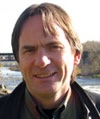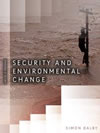Introducing Simon Dalby
 Simon Dalby obtained his Ph.D. (on cold war geopolitics) at Simon Fraser University. He is Professor at Carleton University in Ottawa, teaching courses in political geography, and co-editor of the journal Geopolitics. Professor Dalby is specialised in critical geopolitics, environmental security and the geographical dimensions of global politics.
Simon Dalby obtained his Ph.D. (on cold war geopolitics) at Simon Fraser University. He is Professor at Carleton University in Ottawa, teaching courses in political geography, and co-editor of the journal Geopolitics. Professor Dalby is specialised in critical geopolitics, environmental security and the geographical dimensions of global politics.
His new book “Security and Environmental Change” has just been published by Polity Press: Book description by Polity Press.
Geopolitical Passport
Your relationship with geopolitics
At what age did you discover geopolitics and what attracted you to it?
Somewhere along the way as an undergraduate I came across some geopolitical material but never followed it up in much detail.
When I was starting my Ph.D. research in 1983 Ronald Reagan was making bellicose statements about the evil empire, and clearly there were all sorts of geographical framings to the remilitarization of American foreign policy.
I wasn’t attracted to geopolitics; I was repulsed by it, and in particular by the geographical formulations used to denigrate other peoples, and the invocation of supposed geographical verities to justify violence.
My work continues to challenge such formulations, to ask how geographical language and conceptualisations justify power and injustice, and to insist that the earth’s peoples deserve what Neil Smith called, back in 1991, the courtesy of geography.
Which geopolitical topics do you focus on and why have you chosen especially these?
I work on the strategic discourse of American foreign policy in particular themes of empire more generally and how all this relates to legitimations of “security”. I’ve also worked on the appropriation of these themes in the rationalisations for foreign and military policies in some of America’s allies. I also write on the debates about globalization and the spatial imaginaries of contemporary international relations.
Recently the debate about environment and conflict spurred on by discussions of climate change has once again engaged my attention and my most recent book is on this debate, linking geopolitics security and environment. These are the core themes of the geography discipline, understanding the earth as the home of humanity; I give this a political twist in my work.
What do you consider your most important contribution to geopolitics?
That is really a matter for others to judge, but my 1990 book Creating the Second Cold War is the first in what is now the recognised field of critical geopolitics. Of course answering this question the month my third book appeared, Security and Environmental Change (Polity Press June 2009), makes me inclined to hope that, given its attempt at theoretical synthesis and a more explicit attempt to reach student audiences, it may in time, be of more significance!!
My geopolitical preferences
What is your favourite definition of geopolitics?
I don’t define geopolitics! It’s a term that refers to numerous modes of linking space and power and is best left that way; it’s a discursive mode, a matter of overlapping discursive practices, not a thing to be reduced to a stable definition.
Which geopolitical scientist do you admire the most
Many of my colleagues are doing fine work these days worthy of praise and emulation. I don’t have a favourite.
What is your favourite geopolitical book?
This is impossible to answer after a quarter of a century of reading, teaching and writing, but in terms of books that have influenced me then Rob Walker’s Inside/Outside (Cambridge U.P. 1993), Gerard Toal’s Critical Geopolitics (U. Minnesota 1996) and Mike Davis’ Late Victorian Holocausts (Verso 2001) rank highly along with Edward Said’s Orientalism.
Earlier stuff that was important was Ken Booth’s Strategy and Ethnocentrism (Croom Helm 1979) and Jerry Sanders Peddlers of Crisis (1983) stimulated my research on geopolitical threat construction, and of course Neil Smith’s original 1984 version of Uneven Development.
I’ve learned more about classical geopolitics from Colin Gray’s voluminous writings than anyone else, but Lewis Mumford’s City in History remains a key moment in my thinking that predates all this stuff.
More recently Derek Gregory’s The Colonial Present is a must read.
What is your favourite geopolitical website?
Well, ExploringGeopolitics of course!!
The geopolitical future
In what direction(s) will geopolitical science be heading the coming decades?
That rather depends on what the current generation of graduate students think is important. Clearly debates about climate change, energy supplies, global poverty, our new “glurban” condition and the possibilities of cooperative ventures to deal with disasters and interconnected livelihoods are important, but the old themes of militarization, and the resistence to it and the depredations of neo-liberalism will alas, remain important.
Which geopolitical subject has been too little in the spotlight and needs further research?
Cities are the new venue for humanity; we have become an urban species this decade. While Steve Graham’s new Verso volume will make a major contribution to this, there is much more to be done on urban geopolitics. But how contextualisations are invoked in political discourse remains key to what we do; how places are constituted, attributes assigned, and policies prescribed on the basis of these prior mapping remains crucial to our enterprise even if we don’t often reflect theoretically on the fact that this is what we are doing.
What will be the largest geopolitical challenge for the world in the 21st century?
The responses to the interconnected crises of global change and the massive inequities in the global political economy are very important, but working to ensure that elites don’t use these matters to justify futile rivalries is essential; the biosphere is way too small for nuclear armed states to threaten each other in the face of coming disruptions.

